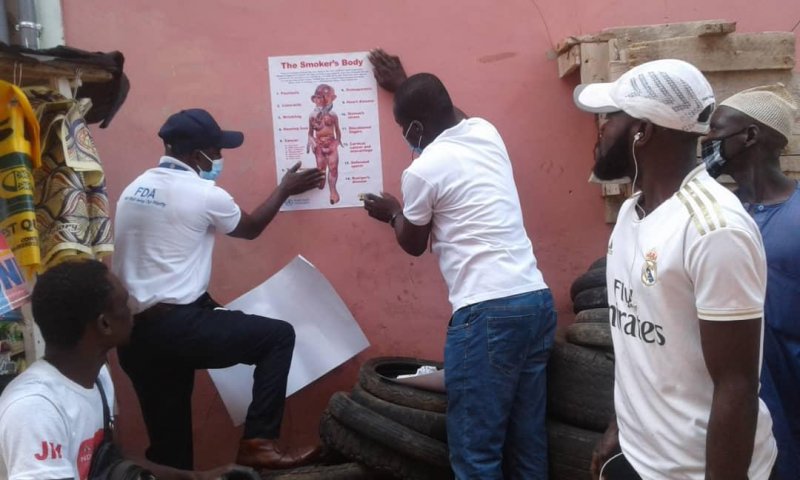Stakeholders working in tobacco control in Ghana have expressed the desire to push for the amendment of the legislation regulating tobacco control to ensure a total ban on smoking in the country. This is in view of the challenges that have arisen so far in the enforcement of the law.
Parliament passed the Public Health Act (Act 851) in October 2012 to revise and consolidate all laws relating to public health to prevent diseases, promote, safeguard, maintain and protect the health of humans and animals and to provide for related matters. Chapter Six of Act 851 has exclusively been dedicated to issues of tobacco control in the country.
Among others it provides for the prohibition of smoking in public places; tobacco advertising, prohibition and sponsorship; points of sale health warning; minimum age restriction; public education against tobacco use; treatment of tobacco addiction; sale of tobacco products; and illicit trade in tobacco products. The law also mandates the Food and Drugs Authority (FDA) to enforce the law.
Several years into its implementation however, stakeholders, including the Ghana Health Service (GHS), the FDA and some members of Civil society groups like the Vision for Alternative Development (VALD) say new and sophisticated tobacco products in the market, coupled with the requirement for a Designated Smoking Area (DSA) in public places is making the enforcement of the law a challenge.
During the launch of a report on findings from a smoke-free study in Ghana on Wednesday, Head of Tobacco and Substances of Abuse Department at the Food and Drugs Authority (FDA), Dr. Olivia Agyekumwaa Boateng, said the Authority is ready to support any amendment that will ensure a total ban on public smoking in the country.
“The law must ban smoking outright. As it is now the FDA cannot do much. The punishment in the law doesn’t appear deterrent enough and so people are going around it. The Designated Smoking Areas is not being adhered to, aside that we are not mandated to ban shisha because shisha is not explicitly mentioned in the law. So there must be a ban on all new innovated tobacco products,” she stated.
She argued that a designated smoking area does not guarantee a smoke-free society because the effects of second hand smoke on non-smokers are dire.
The Presidential Advisor on Health, Dr. Anthony Nsiah Asare, who chaired the function to launch the report, remarked that despite a low smoking prevalence rate in Ghana, there is still a significant burden of disease attributed to tobacco use in the country and the effect of secondhand smoke exposure to both smokers and non-smokers is also substantial.
Read More: 29th Ordinary Session of the ECOWAS Administration and Finance Committee opens in Accra
According to him, with a large vulnerable young population in Ghana and increasing shisha use among the youth, it is timely to understand and review the country’s current smoke-free policy in an effort to prevent exposure to secondhand smoke in public places including hospitality venues such as hotels, bars and restaurants.
He said the World Health Organization (WHO) recommends that all countries implement comprehensive smoke-free policies, without exemptions for a particular venue types or allowances for designated smoking areas, and that effectiveness of comprehensive smoke free laws has been demonstrated in many countries including Scotland, England, Wales and Ireland and more recently in Uganda.
“Ghana has a partial smoke-free policy that allows smoking to continue in certain types of enclosed public venues. Evaluating these policies is an effective means of measuring progress towards a smoke-free society,” Dr Nsiah Asare noted.
Lending his support to the calls, the Director General of the Ghana Health Service (GHS), Dr. Patrick Kuma-Aboagye, noted that Ghana has made significant progress in tobacco control including the ratification of the WHO’s Framework Convention on Tobacco Control (FCTC) as early as 2005, the passage of the Public Health Act in 2012 and the recently introduced regulations (LI 2247).
He lamented the fact that though the FCTC is a solid framework for tobacco control, full implementation of some of its provisions at the country level continues to lag behind.
“We have as a country maintained our smoking rates below 10% prevalence. But current figures among young people are worrying with increased use of shisha particularly among adolescents. The most recent Global Youth Tobacco Survey in 2017 indicates smoking rates among adolescents around 7%, with a third of them exposed to secondhand smoke in public places. However, close to 50% of them were unaware of the harmful effects of secondhand smoke exposure.
“Our smoke free policy in Ghana is not a comprehensive one so it allows the presence of designated smoking and most of the indicators of compliance such as NO SMOKING signage may not be followed in public places. Hence smokers continue to smoke in public places that may be prohibited,” he stated.
Programmes Director of VALD – a civil society organization with interest in tobacco control in Ghana, Labram Musah, told ghananewsonline.com.gh in an interview that it has been almost 10 years since the smoking law was passed yet not much progress has been made by the country to protect smokers and non-smokers from tobacco smoke. He said a review of the law is urgently needed for the effective implementation of the smoke-free law in the country.
He said the civil society community has also become aware of the challenges of the regulator which is making it extremely difficult to enforce the provision of the law on designated smoking areas.
“The findings of the new study by the School of Public Health of the Kwame Nkrumah University of Science and Technology (SPH KNUST) and other studies have buttressed our years of advocacy for a 100% smoke-free Ghana, the evidence is clear now. So we are calling on the Ministry of Health and all relevant agencies to do the needful to protect us all from chronic tobacco related diseases,” he stated.
By Jeorge Wilson Kingson || ghananewsonline.com.gh

